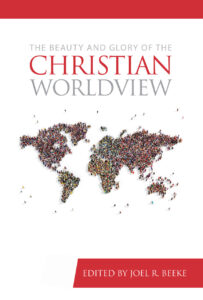The Puritans did not use the term worldview, for such terminology did not appear until the late eighteenth century in Germany and was popularized in the nineteenth century.1The German word Weltanschauung was introduced by Immanuel Kant (1724–1804) and used by writers such as Kierkegaard, Engels, and Dilthey as they reflected on Western culture.” Hiebert, Transforming Worldviews, 13. But the Puritans still had a worldview, which was shaped by the written Word of God. With this divinely given worldview they could examine themselves and the world they lived in. They also had a burning passion to pass on this scriptural worldview to their congregations by teaching them “all the counsel of God” (Acts 20:27), which Matthew Poole (1624–1670) understood to be “the whole doctrine of Christianity, as it directs to a holy life.”2Matthew Poole, Annotations upon the Holy Bible (New York: Robert Carter and Brothers, 1853), 3:452. The Puritans were missionaries to people in their homeland of the British Isles; they understood that it is not enough to just paste Christian language and ritual on top of a fundamentally pagan perspective. As the early Puritans surveyed the towns and countryside of England in the 1560s and 1570s, they realized, as J. I. Packer wrote, “The religion of justification by faith was as little known, and superstition was as widespread and deep-rooted, as it had been for the previous century” before the Reformation had come.3J. I. Packer, A Quest for Godliness: The Puritan Vision of the Christian Life (Wheaton, Ill.: Crossway, 1990), 52. They responded with a massive effort to shape the beliefs, experiences, and practices of people through the ministry of the Word.
If we set out to discuss the whole Puritan worldview, then we would have to teach the equivalent of a class on the Westminster Standards. The great truths enunciated by other speakers at this conference, such as a pilgrim mindset, the Trinity, daily godliness, an embrace of the whole Bible, Old Testament and New, and the divine purpose in human suffering, were all affirmed by the Puritans and pervaded their preaching and living. My aim must be more modest. To allow you to see the world through Puritan eyes, we will first talk about one great truth that illuminated the Puritan worldview—God’s sovereignty (especially His fatherly sovereignty), and then how the Puritans viewed several major areas of life through this lens.
A Worldview Illuminated by God’s Sovereignty
The worldview of the Puritans was God-centered. They taught that creation and providence are the work of God in execution of His eternal decrees. As the Westminster Larger Catechism (Q. 15) affirms: “God did in the beginning, by the word of his power, make of nothing the world, and all things therein, for himself, within the space of six days, and all very good.” The Larger Catechism establishes God’s claim on the world and all who dwell in it. History is the unfolding of His will for us and the record of our response to it, for better or worse. Nor has the God of the Bible left us to our own devices. The Larger Catechism (Q. 18) states, “God’s works of providence are his most holy, wise, and powerful preserving and governing all his creatures; ordering them, and all their actions, to his own glory.”4James Dennison, ed., Reformed Confessions (Grand Rapids: Reformation Heritage Books, 2014), 4:302. Thus the worldview of the Puritans revolved around the sovereignty exercised by God as “Maker of heaven and earth” and “the supreme Lord and King of all the world” (Apostles’ Creed, Art. 1; Westminster Confession of Faith, 23.1).
Reformation Roots of the Puritan Worldview
The Puritans based their view of reality upon God’s fatherly sovereignty because they received this biblical heritage from their forefathers, the Reformers of the sixteenth century. John Calvin (1509–1564) understood that the foundation of all our wisdom is the knowledge of God. He wrote: “It will not suffice simply to hold that there is one whom all ought to honor and adore, unless we are also persuaded that he is the fountain of every good, and that we must seek nothing elsewhere than in him.” Calvin said, “No drop will be found either of wisdom and light, or of righteousness or power or rectitude, or of genuine truth, which does not flow from him, and of which he is not the cause.” Calvin concluded, “I call ‘piety’ that reverence joined with love for God which the knowledge of his benefits induces. For until men recognize that they owe everything to God, that they are nourished by his fatherly care…they will never yield him willing service.”5John Calvin, Institutes of the Christian Religion, ed. John T. McNeill, trans. Ford Lewis Battles (Philadelphia: Westminster, 1960), 1.2.1.
The Heidelberg Catechism (Q. 1) says much of the Christian’s comfort is due to the assurance that “without the will of my heavenly Father, not a hair can fall from my head.”6The Three Forms of Unity (Birmingham, Ala.: Solid Ground Christian Books, 2010), 68. The universal sovereignty of God is thus intensely personal for the believer who rejoices in his new status as the adopted child of God. The catechism affirms this in Question 26:
The eternal Father of our Lord Jesus Christ (who of nothing made heaven and earth, with all that is in them; who likewise upholds and governs the same by His eternal counsel and providence) is for the sake of Christ His Son, my God and my Father; on whom I rely so entirely, that I have no doubt but He will provide me with all things necessary for soul and body; and further, that He will make whatever evils He sends upon me, in this valley of tears, turn out to my advantage; for He is able to do it, being Almighty God, and willing, being a faithful Father.7The Three Forms of Unity, 75–76.
The dominant theme of the Reformed worldview, which is the very “marrow of Calvinism,” is that as the sovereign Creator, Sustainer, and Governor of all things, God reigns through His Son Jesus Christ by the Holy Spirit. B. B. Warfield (1851–1921) rightly said, “The Calvinist, in a word, is the man who sees God…. God in nature, God in history, God in grace. Everywhere he sees God in His mighty stepping, everywhere he feels the working of His mighty arm, the throbbing of His mighty heart.”8Benjamin B. Warfield, Calvin as a Theologian and Calvinism Today (London: Evangelical Press, 1969), 27.
The Puritan Hope in God’s Sovereignty
The Puritans viewed the Reformed doctrine of God’s sovereignty throughout the Holy Scriptures, and embraced it from the heart. They rejoiced to find in Romans 11:36 a reference point from which they could properly view all things: “For of him, and through him, and to him, are all things: to whom be glory for ever. Amen.” William Ames (1576–1633) concluded that nothing happens according to blind fate, or by mere chance, but that “God has a fixed providence by which He cares for all things and directs them to His own glory.”9“William Ames, A Sketch of the Christian’s Catechism, trans. Todd M. Rester (Grand Rapids: Reformation Heritage Books, 2008), 55. This section is adapted from Joel R. Beeke and Sinclair B. Ferguson, The Puritans on Providence,” in Joel R. Beeke and Mark Jones, A Puritan Theology: Doctrine for Life (Grand Rapids: Reformation Heritage Books, 2012), 163, 173
In this worldview, hope triumphs over experience. The Puritans lived in a dangerous world where plague, fire, and war killed many people before they reached middle age, and many children before they reached adulthood. With eyes of faith the Puritans saw the devil going about like a roaring lion seeking someone to devour. Nonetheless, they took great hope from the sovereignty of their covenant-keeping God and Father in heaven. Obadiah Sedgwick (c. 1600–1658) wrote, “No one is so fit to govern the world as He who made it.”10Obadiah Sedgwick, Providence Handled Practically, ed. Joel R. Beeke and Kelly Van Wyck (Grand Rapids: Reformation Heritage Books, 2007), 10. This God exercises perfect wisdom, holiness, justice, and power in His government so that He orders the circumstances, fixes the times, and appoints the means to accomplish His goals.11Sedgwick, Providence Handled Practically, 14–15.
The Puritans clung to the promise of Romans 8:28, “We know that all things work together for good to them that love God, to them who are the called according to his purpose.” The Puritans did not see this sovereign God as a distant figure but as their loving Father in Jesus Christ, so that in all of life they “are pitied, protected, provided for, and chastened by Him as by a Father: yet never cast off,” as the Westminster Confession of Faith (Art. 12) affirms.12Thomas Watson, All Things for Good (1663; repr., Edinburgh: Banner of Truth, 2001), 11.. Thomas Watson (c. 1620–1686) wrote, “All the various dealings of God with his children do by a special providence turn to their good. ‘All the paths of the Lord are mercy and truth unto such as keep his covenant’ (Ps. 25:10).”13Watson, All Things for Good, 11. He said, “The grand reason why all things work for good, is the near and dear interest which God has in His people. The Lord has made a covenant with them. ‘They shall be my people, and I will be their God’ (Jer. 32:38).”14Watson, All Things for Good, 52.
God’s providence offers great comfort to His covenant people. Sedgwick said, “No good man ever lacked anything that was good for him. I may lack a thing which is good, but not which is good for me: ‘For the LORD God is a sun and shield: the LORD will give grace and glory: no good thing will he withhold from them that walk uprightly’ (Ps. 84:11).”15Sedgwick, Providence Handled Practically, 18.. God has a special providence over His church because we are the apple of His eye, His little children, His lambs, and His jewels (Zech. 2:8; Isa. 40:11; 49:15; Mal. 3:17).16Sedgwick, Providence Handled Practically, 21–22. His care for His people is gracious, compassionate, mysterious, glorious, exact, and often extraordinary.17Sedgwick, Providence Handled Practically, 29–30. John Cotton (1584–1652) exclaimed, “Is it a light matter for the God of heaven and earth to be called your Father, since you are but men?” As our Father, God will surely give each Christian “provision for a son here, provision for an heir hereafter,” for “God nurtures us” and “hath given us an inheritance.”18John Cotton, A Practical Commentary, Or an Exposition With Observations, Reasons, and Uses upon the First Epistle General of John (London: by R. I. and E. C. for Thomas Parkhurst, 1656), 218 (on 1 John 3:1).
The Puritan view of God’s sovereignty was sweetened by the gospel of grace. Their perspective on life was both serious and joyful because the Lord of all things is the Father of Jesus Christ, through whose atoning blood believers become children of God. As obedient children led by God’s Word and Spirit, Christians then live to please and honor their Holy Father with the hope that His kingdom is coming.19See Joel R. Beeke, Heirs with Christ: The Puritans on Adoption (Grand Rapids: Reformation Heritage Books, 2008). The Puritans aspired to walk with this God, experiencing distinct communion with the Father, the Son, and the Holy Spirit (cf. 2 Cor. 13:14).20John Owen, Of Communion with God the Father, Son, and Holy Ghost, in The Works of John Owen (Edinburgh: Banner of Truth, 1965), vol. 2.
Read: A Christian Worldview Applied To Every Area Of Life
Excerpt From
The Beauty and Glory of the Christian Worldview
Joel R. Beeke and Paul M. Smalley










